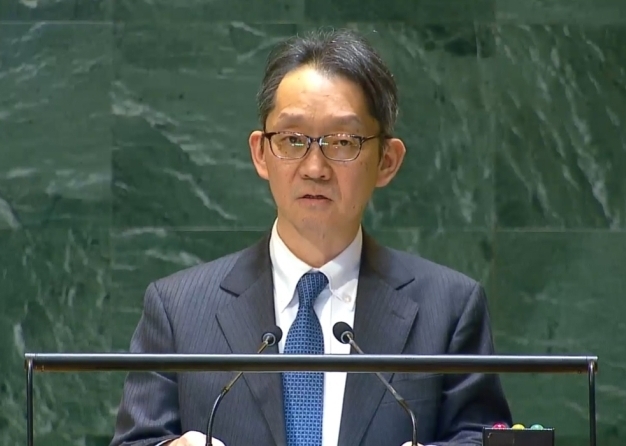Statement by H.E. Ambassador MIKANAGI Tomohiro, Deputy Permanent Representative of Japan to the United Nations, at the Plenary Meeting of the General Assembly on the use of the veto [item 63]
2024/11/20

(As delivered)
Mr. President,
We thank you for convening the third debate on the Use of the Veto since the adoption of General Assembly resolution 76/262, also known as the “veto initiative.” The importance of this initiative, as a mechanism to hold the Security Council accountable to the entire UN membership, is increasing more than ever under the current international security environment.
Despite the clear mandate of the Council as the chief guarantor of the maintenance of international peace and security under the UN Charter, it is a sad reality that a permanent member has invaded another sovereign state in violation of the Charter while protecting its own national interest by the use or threat of use of the veto. The veto that was wielded to terminate the mandate of the Panel of Experts of the 1718 Sanctions Committee extended this attitude further and undermined the existing important sanction regime created for the maintenance of international peace and security.
This must be rectified.
In the Pact for the Future, the world leaders highlighted the importance of limiting the scope and use of the veto, especially in cases of preventing or ending genocide, crimes against humanity or war crimes. This commitment itself by the leaders is a historic achievement, but we need to implement this initiative in practice.
In this regard, the “Political Declaration on Suspension of Veto Powers in Cases of Mass Atrocity” initiated by France and Mexico, as well as the ACT Group’s “Code of Conduct regarding Security Council action against genocide, crimes against humanity or war crimes,” continue to be valuable initiatives. We urge all permanent members of the Council who have not done so to commit to a voluntary restraint on the use of the veto without delay, and, once committed, to implement it accordingly.
In addition, as reaffirmed in the Pact, we need to fully implement and adhere to all provisions of the UN Charter regarding the decision-making process in the Council, including Article 27 (3).
Mr. President,
The veto is another example of the existing inequity within the Security Council on top of the lack of fair representation in its permanent and non-permanent membership.
We need to reform the Council as soon as possible, so that it can better reflect today’s reality rather than that of 80 years ago.
At this critical juncture for international peace and security, we need a Council that can better address the challenges we face.
During the High-level Week in September this year, almost 120 Member States made statements explicitly calling for Security Council reform. This is an even greater number than last year and shows a growing sense of urgency for a more representative, efficient, and effective Council.
Colleagues, let us seize the moment.
Thank you.
